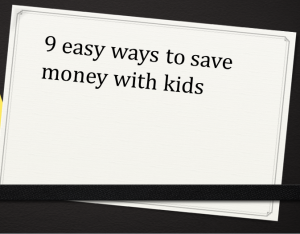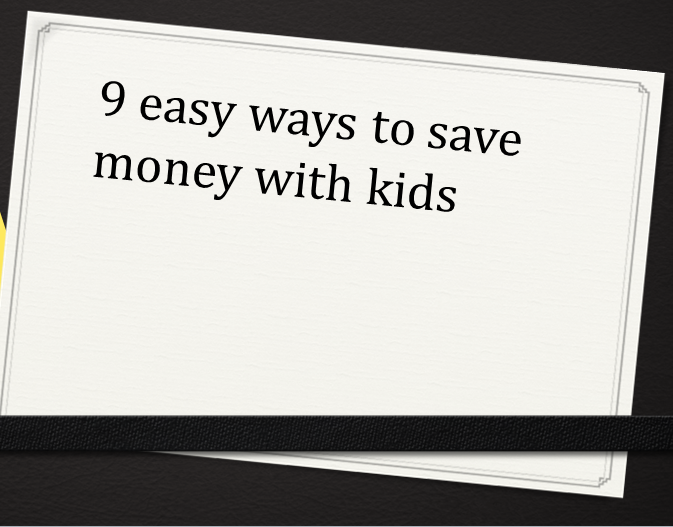Balance Giving vs Investing
 When I get to the Q&A portion of my classes there is a question I always get. “How do you balance giving and saving/investing?”
When I get to the Q&A portion of my classes there is a question I always get. “How do you balance giving and saving/investing?”
I wish I had a straight answer for the question of giving vs investing, but any short answer does a disservice to the question itself. As believers we are called to give sacrificially and generously to those in need. And it is a part of our culture and even sensible to save money for things like retirement. If you are looking to build a retirement nest egg and give sacrificially it can be a struggle to find any balance between them.
Obviously this isn’t an easy question to answer but here are a few things to consider.
-
Are you living sacrificially?
Take a look at your budget and your spending and ask “Is my giving impacting my lifestyle?”
CS Lewis put it this way:
I am afraid the only safe rule is to give more than we can spare. In other words, if our expenditure on comforts luxuries, amusments etc is up to the standard common among those with the same income as our own we are probably giving away too little. If our chartities do not at all pinch or hamper us, I should say they are too small. There ought to be things we would like to do but can not because our charities exclude them (Mere Christianity)
-
Retirement isn’t biblical
This is a concept most people don’t realize. Retirement isn’t something the bible even addresses. Retirement is a twentieth century invention and it was created to force older workers out of the system so they would stop slowing down production. The only way to do it was to pay them not to work. Now it is just assumed that we will get to stop working one day even if we can’t afford it.
We may need to save for the loss of income as we reach retirement age, but shouldn’t assume that there will come a time where we are not working.
-
Giving in light of God
As Christians we should think about our giving in light of God as the great giver. God planned to show his goodness to us before the foundation of the world in giving his son to save us. Jesus models for us what type of sacrifice we are supposed to display.
Philippians says “Have this mind among yourselves, which is yours in Christ Jesus, who, though he was in the form of God, did not count equality with God a thing to be grasped, but emptied himself, by taking the form of a servant, being born in the likeness of men. And being found in human form, he humbled himself by becoming obedient to the point of death, even death on a cross.” Phil 2:5-8
If Jesus was willing to set aside equality with God we can be willing to set aside equality with our neighbors’ standard of living.
Good Guy Discount
 This goes along with other articles I have written about negotiation. This American Life had a act in one of their shows where a man discussed is “Good guy discount.” I have always loved the concept he discussed, but this gave me a great method to ask for a discount without coming off like a jerk.
This goes along with other articles I have written about negotiation. This American Life had a act in one of their shows where a man discussed is “Good guy discount.” I have always loved the concept he discussed, but this gave me a great method to ask for a discount without coming off like a jerk.
I ask for the “Good guy” discount. It has worked 100% of the time so far. Granted I have only tried it twice, but that doesn’t change the success rate.
At the Cincinnati aquarium I learned that our local Zoo was no longer part of their reciprocal discount program. They used to be but had neglected to sign up this year. So, I said “OK, just give me the good guy discount then.” The girl behind the glass laughed and asked if I was an alum from any of the local universities. Which I wasn’t. Then she moved onto other organizations; she must have gone though 10 or 15 until she finally found a way to give us a 20% discount on our 4 tickets.
Asking for the “Good guy” discount disarms the person you are talking to with humor. Obviously, they won’t have a “Good guy” discount but I find they will do what they can because you ask. A lot of places have a plethora of discounts available and even if you don’t qualify for one you may get it just for asking.
Plus as an added bonus you don’t have to feel embarrassed if you are asking for the “Good guy” discount because you can always laugh it off if it gets awkward, but it never hurts to ask.
Image courtesy of Cubmundo
9 ways to save money with kids.
Here are 9 great ways to save money with kids.
- Create a Babysitting Co-Op No not like those books from such a long time ago but if you and another couple can exchange babysitting services it will give both of you a free night out. You watch their kids this week they watch yours next week. Now you can have date night without paying cash for a sitter. This is great for your marriage as well as your wallet.
- Hand me arounds There is no reason to buy all new clothes for your child, especially when they can only where the same thing for a few months before they grow out of it. When you are done pass them along and find someone else to do the same with. My wife has a Mothers group at church that constantly passes clothes around and saves everyone a ton.
- Play at the Public Park Why not just go to the park and play with other kids, you already paid for it.
- Watch the local parks for educational programs Take your kids to these and they may have so much fun they won’t even realize they are learning.
- Public Libraries There is so much that can be had at public libraries from internet access to the books and learning programs.
- Use city services There are plenty of free (already paid for through taxes) activities for children around our city, between Metro parks and libraries there is plenty to keep them entertained.
- Watch local churches Especially in the summer there are tons of Vacations Bible Schools for kids’ activities.
- Stop spending so much on your kids Really they want your time and love more than anything. Make up games you can play at home all the time or just play tag.
- Buy in bulk and pack your own snacks. Our kids know if we are gong to the museum or the Zoo they are carrying their own food and we don’t buy it there. We taught them how much things cost and now our kids see prices and ask “Who would pay for that?”
What are other great ways you save money with your kids?
You should always have a car payment.
 You should always have a car payment. Unless you live somewhere like NYC where you don’t need a car, then you can move on to another one of our great articles. You should always have a car payment, not so you can drive the newest model every year, that would be crazy. However, most of us are in a place where we will be needing a new car sooner or later. How are you going to pay for that car without going into debt and taking on a few hundred dollars a month?
You should always have a car payment. Unless you live somewhere like NYC where you don’t need a car, then you can move on to another one of our great articles. You should always have a car payment, not so you can drive the newest model every year, that would be crazy. However, most of us are in a place where we will be needing a new car sooner or later. How are you going to pay for that car without going into debt and taking on a few hundred dollars a month?
Always have a car payment and make it to yourself.
If your car is paid off, find some money in your budget and dedicate it to your car fund. Even if it is just $50 or $100 dollars a month it will help a lot in the long run.
Think about it. If you take out a loan for a $10,000 car and you just pay the minimum you are paying around $2000 in interest over the course of the 5 year loan. That is 20% increase in the cost of the car. Would you have paid 20% more for your car up front?
Every thousand dollars you put down saves you close to $200 in extra interest. And perhaps you can even save enough to not need a loan in the first place. If you take good care of your car there is no reason why you can’t pay cash for your next one.
This habit also prevents lifestyle creep. If you always have a car payment you never get used to living without one. Then if you really did need to take out a loan you don’t won’t feel the squeeze in your budget, because the payment is already there.
I am a fan of driving a car as long as you can, but I will admit I don’t feel like taking that route with my wife and kids so perhaps she can get a newer car before I do.
Financial Samurai has a great article on how to determine how much you can spend on a car. It is an interesting idea but I am not sure how practical it is if you try to live it out. It would definitely help to prevent getting in over your head.
Cash as a commitment device
 What is a Commitment Device?
What is a Commitment Device?
Never heard of a commitment device?
A commitment device is a choice that an individual makes in the present which restricts his own set of choices in the future, often as a means of controlling future impulsive behavior and limiting choices to those that reflect long-term goals.
The most interesting example I heard was of a man who wanted to lose weight and so we took embarrassing pictures of himself and gave them to a friend who promised to publish them if he did not meet his weight loss goal. Just having a budget it a way to control the actions of your future self. It allows your logic to take control before you emotions get out control.
Cash as a Commitment Device
Cash can be a more serious method of keeping spending under control. Unlike a credit card or even a debit card, cash holds a hard line on your spending. Once the cash is gone you can’t spend any more of it.
We use an envelope system for certain parts of our budget that we don’t use automatic bill pay for.
- Groceries
- Household
- Personal Care
- Dining Out
- Kid’s Allowances
We use cash for each of these categories for some different reasons. Groceries/Household/Dining out – to help to control spending. Personal care/Allowances – Because money comes out of those at irregular intervals, but I don’t want to spend the money in other places by accident.
There are people who use cash for all of their budget, but for us that seems like a bit of overkill. We have found that for these categories it works perfectly for us
Image by 401(K) 2012
1 easy way to save a grand in a year; reduce your property tax
 Almost a year ago I stumbled onto a little company called ValueAppeal. They offer to help you file to have your property tax reduced based on an overvaluation of your property. I have finally gotten through the process and am ready to do my Valueappeal review only to find out that they dropped that part of their business. But the good news is, anyone can still fill out the paper work and challenge the valuation of their property.
Almost a year ago I stumbled onto a little company called ValueAppeal. They offer to help you file to have your property tax reduced based on an overvaluation of your property. I have finally gotten through the process and am ready to do my Valueappeal review only to find out that they dropped that part of their business. But the good news is, anyone can still fill out the paper work and challenge the valuation of their property.
The time when the usefulness is getting shorter as property values are beginning to rebound from the recession, however it may still be worth your while if you want to pay less in property tax to look at properties around you and see if they are worth more or less than yours
Property Tax basics
Property taxes are taxes on real property (usually homes) which fund schools, and other services for a county or region. They are based on the real or perceived value of the property.
If you decide to go through this process it is not a time to be emotional, you don’t really want to admit that your home is not worth as much as your neighbor but the reality is there are more factors than you can control that contribute to the value of your home. Most taxing districts allow for some sort of process to object to the value of your property, you may need to fill out some paperwork and perhaps attend a hearing. But it is possible to save thousands of dollars a year. I was able to save over $1500 dollars. Which will be helpful if we need to rent out our current property.
Image by danmoyle
Everything can be a pre-tax deduction
 A Pre-tax deduction refers to things done the governments preferred way that reduce the amount of income you pay taxes on. For example if you make $50,000 a year and you put $10,000 into a 401(k) (one of the governments preferred savings methods) then you will only pay taxes on $40,000 a year. This is a nice way to reduce the amount of taxes you pay at the end of the year and with things like a 401(k) the money is taken out of your paycheck before you see it, so you never even have the contributed money. Not only does this prevent you from missing a deposit to your retirement it makes your taxes simpler because you employer tells the IRS that you only earned 40,000.
A Pre-tax deduction refers to things done the governments preferred way that reduce the amount of income you pay taxes on. For example if you make $50,000 a year and you put $10,000 into a 401(k) (one of the governments preferred savings methods) then you will only pay taxes on $40,000 a year. This is a nice way to reduce the amount of taxes you pay at the end of the year and with things like a 401(k) the money is taken out of your paycheck before you see it, so you never even have the contributed money. Not only does this prevent you from missing a deposit to your retirement it makes your taxes simpler because you employer tells the IRS that you only earned 40,000.
Post tax deductions are things like mortgage interest, IRA deductions etc that are tax deductible, which means (Normally) when you pay $5,000 of mortgage interest you will get the tax you paid on that $5000 back at the end of the year. This is what we call a tax refund, it is money you over paid to the government throughout the year. It is like getting change at the grocery store, only you have to wait months and fill out a lot of paperwork to get it.
Both post-tax and pre-tax deductions are tax deductible, which means you do not have to pay taxes on them. The difference is that you don’t get all of your money from post-tax deductions up front. The government still taxes the money and then gives it back to you when you file your taxes. Maybe you don’t mind giving Uncle Sam an interest free loan or think he can spend your money better than you can but I don’t think so.
When I moved to my new job recently I was disappointed to learn that they did not do a matching 401(k) contribution. In order to make up for my disappointment they offered me a signing bonus (read onetime bonus) I asked for that money as part of my salary(so I could have it every year), which they were happy to do. (Always negotiate your salary and benefits) I had intended to roll over my old 401(k) to the new one for my company, but instead decided to roll it into a traditional IRA with my old friends over at Fisherwealth. (To the best of my knowledge no relation, but we have done business together for years). I can now take the money I negotiated and deposit it to my new IRA. But, what am I to do about the money being a post-tax deduction? I am being taxed on that money even though it is tax deductible.
This is when I realized that if you know how things work you can make almost anything a pre-tax deduction. When I started my new job they asked me to fill out a form to determine how much money the federal and state governments should take out of my income every paycheck. To pay my taxes. Now this isn’t a nice simple form like take out $100 per check, no it is a complicated formula so you most people don’t realize what is going on. But, as I have written about here, you can get your tax refund all year long by filling out this form properly.
This way all your tax deductible expenses including your child credits etc, can be pre-tax. The IRS has a handy little calculator to determine how to eliminate your federal refund and get the most out of your paycheck. It is here if you want to check it out.
Do you prefer to get a big refund or a bigger paycheck?
Image by irsein
Ways you are wasting money
There are tons of places we all waste money every day. Here are some big ones I have learned about the hard way. Check the list below and see if you are wasting money with any of these.
- Giving Uncle Sa
 m an interest free loan – Why should you let the government hold onto your money all year only to give it back to you interest free? Check out our article on “Giving Yourself a Raise” for more details.
m an interest free loan – Why should you let the government hold onto your money all year only to give it back to you interest free? Check out our article on “Giving Yourself a Raise” for more details. - Carrying a balance – If you are have $1000 on a credit card at 19% you are paying $190 a year in interest. That same money in a savings account would earn you about $19, if you are lucky.
- Ignoring little things around the house – Small issues around the house may lead to larger issues if not resolved. Fixing things earlier will save you money.
- Not giving to to your 401(k) – Make sure you understand how your companies 401(k) works so you can get the most out of it possible. If your employer will match any part of your contributions you are leaving money on the table by not contributing. There may be other employer benefits you are not taking advantage of.
- Paying bank fees – It happens to the best of us, we forget to pay a bill, (Which is why you should automate your finances) or you overdraft.
- Leaving money on the table – Ever gotten a rebate you didn’t follow up on? Ever added money to an online service you stopped using and left the money there? I have I still have $25 in a Pokerstars account and a few dollars of credit in some other places.
- Policies that don’t fit your needs – You may be paying more than you need to for an old policy that doesn’t fit your needs. Are you paying extra for a low deductible? Or are you missing discounts you didn’t qualify for before?
- Driving stupid – I always laugh at the people who speed around me just to sit at the same light I was already slowing down for. So much gas (and therefore money) is wasted by stupid driving and poorly inflated tires.
What other ways do you see money being wasted? Tell me in the comments, I would love to hear from you.
How to compare job offers
When you are faced with a new job offer (other than being extremely blessed) you may be in for a rough ride. How do you make such an important decision? How are you to compare job offers? If you are like me you may try to analyze and quantify every detail of each position in order to make a decision. It can be difficult and there are a lot of things to think about. This article will hopefully assist you with such a decision.
I have just gone through this process myself so it is clear in my mind.
The Intangibles.
Obviously there will be things you can’t quantify. If you have a really great relationship with your coworkers. (or a really bad one) If you are working for a non-profit that is really important to you. These are things that you can’t convert into a formula to make a decision so for the sake of this article I am going to ignore them. You will have to determine how important these things are for yourself.
Base Pay
This is the easiest to compare and the largest portion of your compensation. This is easily examined simply by looking at what they are going to pay you if you are salary or by doing some simple math if you are hourly. Hourly rate multiplied by 2080 gives you a yearly rate assuming no overtime.
Insurance costs
Having just lived through this I learned that my old employer had really great insurance rates and where ever I went I was looking at doubling my insurance costs. Always ask for this information before accepting a new job you may learn that you have actually taken a pay cut because an increased cost of insurance has eaten up your raise.
Vacation
Starting over in a new job often means that you are losing paid time off or vacation. I compared this by multiplying it by my daily salary rate to determine how much the vacation was worth in dollars.
Commute
The book “Your Money or Your Life” is great for helping you see all the costs associated with your job, including commute and clothes. The IRS millage rate for 2014 is $.56 so take your commute and multiply by this number to make sure you won’t be losing money in the cost of driving.
Additionally, I tried to quantify the hours I was going to spend in my commute. One of the offers I was looking at put me far away from home and into heavy traffic so my actual commute would have been longer than the millage lead me to believe.
401(k)
The match, if any for your 401(k) can be a large difference between two jobs. If your current jobs matches 50% of the first 4% of your salary and your new job doesn’t offer a match then you are giving up all that tax free money.
Other Extras
There may be other offerings from your employers, some of them get very creative to attract top talent. What else do you think you should examine?
Image by winnifredxoxo
My extra income adventure: A New Series
 I am going to be kicking off a new series on this blog. I have been interested in producing some extra income in my life in order to help to pay for the down payment for my house. I have often looked into passive income ideas and it seems like most of them are anything but passive. Passive income is income that you don’t directly trade time and labor for money. Examples would be royalties, or licensing etc. Although my book would fall under this category I don’t have any delusions about making millions of dollars from it. (although it would be nice)
I am going to be kicking off a new series on this blog. I have been interested in producing some extra income in my life in order to help to pay for the down payment for my house. I have often looked into passive income ideas and it seems like most of them are anything but passive. Passive income is income that you don’t directly trade time and labor for money. Examples would be royalties, or licensing etc. Although my book would fall under this category I don’t have any delusions about making millions of dollars from it. (although it would be nice)
I had considered getting a second job, but didn’t want to give up time with my children who I only see 3 hours a night as it is. So, one of my qualifications for these ideas is that I am not simply trading my time for money directly. (I will do this job for x dollars) I hope to find other ways to work once and make money over and over with that work. I plan on doing some of this by outsourcing some of the work that I can’t do, or don’t have time to do. If I do my calculations correctly the Virtual Assistant (VA) should pay for themselves.
I have some money that I am able to invest in business ideas to capitalize a few of them, which makes me fortunate. If you want to see this done with almost no money check out UpwardsofTwenty. He is starting with $20 dollars and investing in interesting ways to grow from that $20 to where ever he ends up.
My plan is to start with some small ideas that I can put into place once and make more than an hourly wage in the process. I am not going to throw my money at any get rich quick schemes, that would be bad steward ship although even those crack pot ideas have real extra income ideas as their kernel of truth.
After I have completed my first venture I will update you with the plan I followed and the money I made. I plan to be as open and honest as I can with this part in the interest of transparency.
In order to keep myself sane I am going to look at any money invested that loses money as the cost of education. I find that I am very hesitant to take risks but hopefully I can break myself of that mindset with some small victories.








